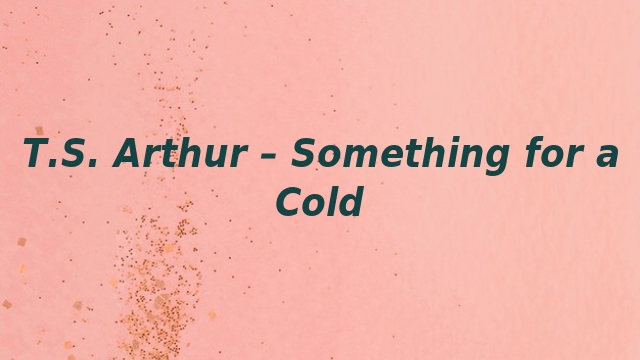
T.S. Arthur – Something for a Cold
“Henry,” said Mr. Green to his little son Henry, a lad in his eighth year, “I want you to go to the store for me.”
Mr. Green was a working-man, who lived in a comfortable cottage, which he had built from money earned from honest industry. He was, moreover, a sober, kind-hearted man, well liked by all his neighbors, and beloved by his own family.
“I’m ready, father,” said Henry, who left his play, and went to look for his cap, the moment he was asked to go on an errand.
“Look in the cupboard, and get the pint flask. It’s on the lower shelf.”
Henry did as desired, and then asked–“What shall I get, father?”
“Tell Mr. Brady to send me a pint of good Irish whiskey.”
The boy tripped lightly away, singing as he went. He was always pleased to do an errand for his father.
“This cold of mine gets worse,” remarked Mr. Green to his wife, as Henry left the house. “I believe I’ll try old Mr. Vandeusen’s remedy–a bowl of hot whiskey-punch. He says it always cures him; it throws him into a free perspiration, and the next morning he feels as clear as a bell.”
“It is not always good,” remarked Mrs. Green, “to have the pores open. We are more liable to take cold.”
“Very true. It is necessary to be careful how we expose ourselves afterwards.”
“I think I can make you some herb-tea, that would do you as much good as the whiskey punch,” said Mrs. Green.
“Perhaps you could,” returned her husband, “but I don’t like your bitter stuff. It never was to my fancy.”
Mrs. Green smiled, and said no more.
“A few moments afterwards, the door opened, and Henry came in, looking pale and frightened.
“Oh, father!” he cried, panting, “Mr. Brooks is killing Margaret!”
“What!” Mr. Green started to his feet.
“Oh!” exclaimed the child, “he’s killing her! he’s killing her! I saw him strike her on the head with his fist.” And tears rolled over the boy’s cheeks.
Knowing Brooks to be a violent man when intoxicated, Mr. Green lost not a moment in hesitation or reflection, but left his house hurriedly, and ran to the dwelling of his neighbor, which was near at hand. On entering the house, a sad scene presented itself. The oldest daughter of Brooks, a girl in her seventeenth year, was lying upon a bed, insensible, while a large bruised and bloody spot on the side of her face showed where the iron fist of her brutal father had done its fearful if not fatal work. Her mother bent over her, weeping; while two little girls were shrinking with frightened looks into a corner of the room.
Mr. Green looked around for the wretched man, who, in the insanity of drunkenness, had done this dreadful deed; but he was not to be seen.
“Where is Mr. Brooks?” he asked.
“He has gone for the doctor,” was replied.
And in a few minutes he came in with a physician. He was partially sobered, and his countenance had a troubled expression. His eyes shrunk beneath the steady, rebuking gaze of his neighbors.
“Did you say your daughter had fallen down stairs?” said the doctor, as he leaned over Margaret, and examined the dreadful bruise on her cheek.
“Yes–yes,” stammered the guilty father, adding this falsehood to the evil act.
“Had the injury been a few inches farther up, she would ere this have breathed her last,” said the doctor–looking steadily at Brooks, until the eyes of the latter sunk to the floor.
Just then there were signs of returning life in the poor girl, and the doctor turned towards her all his attention. In a little while, she began to moan, and moved her arms about, and soon opened her eyes.
After she was fully restored again to conscious life, Mr. Green returned to his home, where he was met with eager questions from his wife.–After describing all he had seen, he made this remark–
“There are few better men than Thomas Brooks when he it sober; but when he is drunk he acts like a demon.”
“He must be a demon to strike with his hard fist, a delicate creature like his daughter Margaret. And she is so good a girl. Ah, me! to what dreadful consequences does this drinking lead!”
“It takes away a man’s reason,” said Mr. Green, “and when this is gone, he becomes the passive subject of evil influences. He is, in fact, no longer a man.”
Mrs. Green sighed deeply.
“His poor wife!” she murmured; “how my heart aches for her, and his poor children! If the husband and father changes, from a guardian and provider for his family, into their brutal assailant, to whom can they look for protection? Oh, it is sad! sad!”
“It is dreadful! dreadful!” said Mr. Green.–
“It is only a few years ago,” he added, “since Brooks began to show that he was drinking too freely. He always liked his glass, but he knew how to control himself, and never drowned his reason in his cups. Of late, however, he seems to have lost all control over himself. I never saw a man abandon himself so suddenly.”
“All effects of this kind can be traced back to very small beginnings,” remarked Mrs. Green.
“Yes. A man does not become a drunkard in a day. The habit is one of very gradual formation.”
“But when once formed,” said Mrs. Green, “hardly any power seems strong enough to break it. It clings to a man as if it were a part of himself.”
“And we might almost say that it was a part of himself,” replied Mr. Green: “for whatever we do from a confirmed habit, fixes in the mind an inclination thereto, that carries us away as a vessel is borne upon the current of a river.”
“How careful, then, should every one be, not to put himself in the way of forming so dangerous a habit. Well do I remember when Mr. Brooks was married. A more promising young man could not be found–nor one with a kinder heart. The last evil I feared for him and his gentle wife was that of drunkenness. Alas! that this calamity should have fallen upon their household.–What evil, short of crime, is greater than this?”
“It is so hopeless,” remarked Mr. Green. “I have talked with Brooks a good many times, but it has done no good. He promises amendment, but does not keep his promise a day.”
“Touch not, taste not, handle not. This is the only safe rule,” said Mrs. Green.
“Yes, I believe it,” returned her husband.–“The man who never drinks is in no danger of becoming a drunkard.”
For some time, Mr. and Mrs. Green continued to converse about the sad incident which had just transpired in the family of their neighbor, while their little son, upon whose mind the fearful sight he had witnessed was still painfully vivid, sat and listened to all they were saying, with a clear comprehension of the meaning of the whole.
After awhile the subject was dropped. There had been a silence of some minutes, when the attention of Mr. Green was again called to certain unpleasant bodily sensations, and he said–
“I declare! this cold of mine is very bad. I must do something to break it before it gets worse. Henry, did you get that Irish whiskey I sent for?”
“No, sir,” replied the child, “I was so frightened when I saw Mr. Brooks strike Margaret, that I ran back.”
“Oh, well, I don’t wonder! It was dreadful. Mr. Brooks was very wicked to do so. But take the flask and run over to the store. Tell Brady that I want a pint of good Irish whiskey.”
Henry turned from his father, and went to the table on which he had placed the flask. He did not move with his usual alacrity.
“It was whiskey, wasn’t it,” said the child, as he took the bottle in his hand, “that made Mr. Brooks strike Margaret?” And he looked so earnestly into his father’s face, and with so strange an expression, that the man felt disturbed, while he yet wondered at the manner of the lad.
“Yes,” replied Mr. Green, “it was the whiskey. Mr. Brooks, if he had been sober, would not have hurt a hair of her head.”
Henry looked at the bottle, then at his father, in so strange a way, that Mr. Green, who did not at first comprehend what was in the child’s thoughts wondered still more. All was soon understood, for Harry, bursting into tears, laid down the flask, and, throwing his arms around his father’s neck, said–
“Oh, father! don’t get any whiskey!”
Mr. Green deeply touched by the incident, hugged his boy tightly to his bosom. He said–
“I only wanted it for medicine, dear. But, never mind. I won’t let such dangerous stuff come into my house. Mother shall make me some of her herb-tea, and that will do as well.”
Henry looked up, after a while, timidly.–“You’re not angry with me, father?” came from his innocent lips.
“Oh, no, my child! Why should I be angry?” replied Mr. Green, kissing the cheek of his boy. Then the sunshine came back again to Henry’s heart, and he was happy as before.
Mrs. Green made the herb-tea for her husband, and it proved quite as good for him as the whiskey-punch. A glass or two of cold water, on going to bed, would probably have been of more real advantage in the case, than either of these doubtful remedies.





